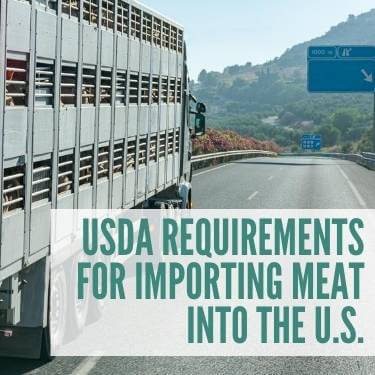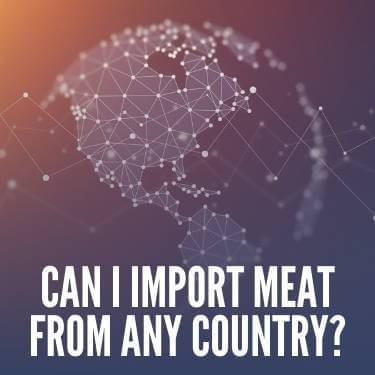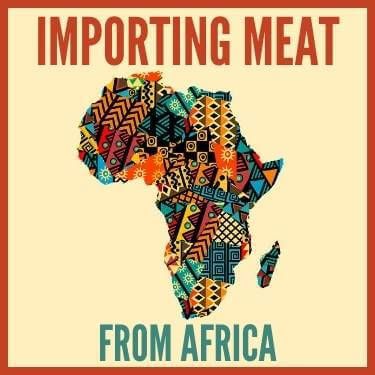What Are the Regulations of Imprting Beef

The food industry often relies on importing meat into the U.S. from a variety of sources. It means a lot of documentation must be filed in advance to clear customs. This guide is a comprehensive look at what needs to be done.
Share This Article
 Copy URL to Clipboard
Copy URL to Clipboard
Last Modified: March 16, 2022
If you're importing meat into the U.S., you may have encountered some difficulties in the form of tight regulations and custom and borders control. This is the case with all food products imported into the U.S., but it's unusually strict when it comes to meat. Meat products must arrive from vetted countries and meet the requirements of their respective Federal agencies as well as the FSIS. This is in relation to the quality of the meat, the packaging, the labelling and its documentation. Checks are regularly made by FSIS specialists at ports to ensure all products are eligible. It is important to protect the economy and public health. When importing meat into the U.S., you must meet the requirements of the FSIS, which is a branch of the USDA assigned to oversee the import regulations for meat, poultry, and eggs into the country. These regulations are stringent and require imports to comply with packaging and labeling rules. Non compliance can result in seized shipments or sever financial penalties. If you're looking to import meat into the U.S. now and need customs support, our team is here to help. We offer 1-on-1 customs consulting services to go over every detail of your upcoming shipments and ensure it's in compliance. Additionally, we also offer a continuous bond with same day approval. Get help from our meat importing experts. We'll ensure your meat import is compliant and will safely clear customs. Our comprehensive guide below goes through all of the requirements that must be met to avoid an unfortunate outcome. We look at the Federal agencies involved in the importing process and how they regulate the process both within the U.S. and within eligible countries. Find out what the correct labelling requirements are for meat imports and what countries can confidently import meat onto U.S. soil. The USDA is responsible for protecting American citizens by ensuring that companies importing meat into the U.S. such as meat, poultry, and eggs are accurately labelled and safe for public consumption. Beneath the USDA are two departments that regulate separate food types. The FSIS regulates meat, poultry, and egg products, while the FDA regulates all other types of imported food. The two agencies differ in their approaches. The FDA requires companies importing food into the U.S., other than meat, eggs, and poultry to register with them. The FDA then relies on the point of entry inspections for all products. The FSIS, on the other hand, does not deal with companies directly but instead coordinates with governments on the strict requirements for importing meat, eggs, and poultry. The FSIS employs a reinspection process, meaning that respective government agencies inspect produce and are then re-checked by the FSIS, thereby ensuring an extra level of protection to the U.S. public. This process begins by FSIS determining if a country's inspection procedures are equivalent to the U.S. They do not have to be identical, but they must have equivalent measures of protection for meat, poultry, and eggs. The FSIS uses document reviews, on-site audits, and port of entry examinations in addition to the importing country's equivalent inspection system. The FSIS visually inspects all meat, poultry, and egg shipments entering the U.S., and their documentation signed off. At ports of entry across the country, FSIS import inspectors are on hand to reinspect particular shipments flagged as problematic by a centralized computer. The application process for a country wishing to import meat, poultry, or eggs into the U.S. is extremely stringent. Prospective importers must first apply to their agencies; the foreign government will then apply to the FSIS. A team of experts reviews the application, and an on-site audit is carried out before verification. There are strict labeling requirements for importing meat into the U.S. that are regulated by the FSIS under the USDA. These rules govern the content and appearance of meat and poultry products, as well as usage instructions and best practices. FSIS must approve everything from the date, and handling instructions to the size of the font on the label: this ensures consumers can make informed choices on safe products. All meat and poultry products sold in the U.S. must comply with the labeling requirements. Every label must include: For information on importing organic meat, check our article on importing organic food to the U.S. Get help from our meat importing experts. We'll ensure your meat import is compliant and will safely clear customs. Not every country wishing to Import meat Into the U.S. can qualify for the stringent regulations set down by the FSIS. The department uses criteria based on product categories and eligibility to determine what products are safe for public consumption in the U.S. Some products are restricted due to disease status in the species. FSIS categorizes products in terms of Process Category, Product Category, and Eligible Products. The Process category determines how the products are processed after slaughter. The Product Category links the product to the appropriate species, including additional information regarding the production process. The category of Eligible Products is a detailed grouping of products imported from countries with equivalent standards to the FSIS. Australia qualifies as an eligible importer of meat and poultry into the U.S. They have FSIS equivalent regulations in place. For example, Australia imports raw products such as beef and veal. According to the FSIS categorization, the Process Category is Raw Intact, the Product Category is Raw Intact Beef, and the Eligible Products are Beef and Veal. Canada qualifies to import meat, poultry, and eggs into the U.S. based on FSIS criteria and regulations. Their eligible products include beef and veal, chicken, lamb, pork, and turkey. One example of a Process Category for Canada is Fully-Cooked, Not Shelf Stable. The Product Category would be Ready-To-Eat (RTE) Fully-Cooked Poultry, and the Eligible products would include: Chicken, Duck, and Turkey. Some countries are restricted in what they can import to the U.S. In the case of Israel; products are limited to chicken and turkey. The only Process Category available to Israel is Fully-Cooked Not Shelf Stable. Their Product Category only includes RTE Fully Cooked Poultry and eligible products are Chicken and Turkey. If you're subsequently exporting your meat, you may be eligible for a duty drawback refund. If you need help with customs duty drawback, we can serve as your duty drawback broker and assist you with the entire process. Recently the NAFTA agreement between the USA, Mexico, and Canada has been reformed and is now called the United States-Mexico-Canada Agreement (USMCA). The agreement seeks to improve trade between the nations by creating a more level playing field and stimulating American manufacturing sectors, which is likely to encourage more companies from Canada and Mexico to import meat into the U.S. There are many benefits to importing meat into the U.S. for those in the agreement, including lower import tariffs, duty-free treatment, lower distribution costs and a higher-quality product. When the agreement is finalized import meat from Mexico and Canada will certainly increase as companies look to take advantage of the perks. For the FSIS, it will be easier to regulate and track products arriving consistently from the same sources. Producers in Canada and Mexico who currently export to places like Argentina, Chile, and Europe will want to improve their yields by redirecting high-quality produce to the U.S. Lower tariffs and fewer transport costs will mean a profit for them as well as an increase in the efficiency of their enterprises. The U.S. is likely to receive a higher quality product at a better price as companies reinvest their profits in better production. Conversely, Mexico and Canada will benefit from the agreement similarly. A steady price and cheaper production will encourage the free flow of goods between the partners, significantly boosting the American meat trade and other industries. The agreement will encourage production at a lower cost and increase the availability of goods on the market. It will mean more choice and higher-quality products for consumers. On July 1, 2022 the USMCA replaced NAFTA and went into effect. While many of the same policies carried over from NAFTA, there are some important differences. For more information, check out our article on NAFTA vs. USMCA. Until recently, there were no African nations importing meat into the U.S. due to FSIS regulations but now Namibia has become the first nation in Africa to qualify for import eligibility. The arid south African nation is known for its free-range, hormone-free beef and is looking to supply the American market with 860 tonnes of beef in 2020, rising to 5000 tonnes by 2025. The U.S. consumes the most red meat worldwide with and estimated 265 pounds per head, according to the USDA. This makes the U.S. a prime target for nations like Namibia, who are exporting quality meat. Speaking from the capital of Windhoek, Namibia's Minister of International Relations, Netumbo Nandi-Ndaitwah, announced the country is excited to be exporting to a significant and lucrative market such as the U.S. For ordinary Americans, the import of quality meat from African nations such as Namibia should mean more choice and better quality. Meatco, Namibia's state-owned meat firm, has said that one of its main targets in the U.S. will be sizable fast-food franchises like McDonald's. Consumers should benefit from a higher quality product, and the franchises themselves will benefit from greater diversification in their supply chain. Get help from our meat importing experts. We'll ensure your meat import is compliant and will safely clear customs. Occasionally people may want to import unprocessed meat into the U.S. that may not be intended for human consumption. It might include hunting trophies, bushmeat, or other restricted animal products that fall outside the FSIS primary regulations. This type of product can pose dangers to health and may carry infectious diseases. Due to this, there are some strict regulations in place. Nonhuman primate trophy materials require a permit from the Centre For Disease Control (CDC) unless it is presented along with proof that the item has been rendered noninfectious. It could be in the form of a veterinary or taxidermy certificate. If the item is unprocessed and the bearer still wishes to import it, this might be possible if the material meets the permit requirements. An application needs to be lodged with the CDC's Import Permit Program (IPP). The CDC restricts some trophy animals because they pose a significant risk of infecting humans. These animals include African rodents, bats, civets, and small turtles. If you are unsure what animals are restricted you can find out more at the link Bringing an Animal into the U.S. If the restricted animal trophy has been sufficiently processed to render it noninfectious it will be eligible for import. Bushmeat refers to meat that is raw or unprocessed. It is derived from wild animals such as cane rats, duiker antelopes, nonhuman primates, and bats. There are U.S. Federal restrictions on the importation of bushmeat, and the majority of it is illegal to ship or mail. This does not apply to smoked snails as long as they are declared. As with trophy animals, the material may be eligible for import if it can be rendered noninfectious and proof presented. Veterinary or taxidermy certificates are the most common form of evidence. If you are importing meat into the U.S., it is advisable to work with a Customs Broker to avoid delays, costs, and potential loss of productivity. The U.S. has very stringent rules and regulations for the import of meat and if you don't comply, you could be in line for fines and lost revenue. Working with a Customs Broker can ensure your meat shipment gets to where it needs to be the first time, without any liability. Meat is imported into the U.S. every day in shipments arriving at ports all over the country. They are met by U.S. Customs and Border Protection (CBP) and specialists from the USDA who carry out inspections to ensure the meat coming in is eligible and noninfectious. It does this using a centralized computer system, visual checks, and ensuring the packaging and FSIS labelling is correct. Any errors found in the shipments can result in lost batches and fines depending on the offence. These checks must be carried out since an infectious product or one carrying pests could result in damage to the U.S. economy or pose a health risk to the public. If FSIS inspectors discover that a shipment is faulty for some reason the entire shipment will be detained and is likely to be destroyed. That is a good reason for working with a custom's broker who will ensure your shipments are compliant with U.S. rules and regulations prior to arrival at the port. Working with a customs broker means you will not lose your shipment. USA Customs Clearance is a customs broker and import consultant who can assist you in streamlining the import of your goods into the U.S. and getting it right the first time. We can provide you with a customs bond, import consulting services, and import/export consulting services for Canada and Mexico. Working with us, you can ensure your products will be accepted by U.S. customs avoiding delays and lost revenue. A customs bond is an agreement between the U.S. Customs and Border Protection (CBP), the surety company and the importer of record to ensure that duties on imports are paid, and rules and regulations are met. This speeds up the process of importing goods by reassuring the CBP that taxes and duties will be paid in a timely manner, all documents and proof of shipment will be in order, and any unforeseen costs will be met. Our import and customs consulting service are excellent if you need any advice on import procedure, shipment contents, or regulatory requirements. If you are unsure about your import for any reason, it's a good idea to seek expert advice. A little preparation can go a long way if you meet with unexpected circumstances that could threaten your shipment. We have helped a broad range of clients from around the world with particular import needs and inquiries. We are committed to assisting you fully at every stage of your import process. Whether it's the regulations around the eligibility of your shipment or the rules of labeling, we will equip you with the necessary knowledge of rules and procedures, and help you fill out any paperwork that may be needed. Our services are affordable and professional, making us the top choice if you're importing meat into the U.S. Get help from our meat importing experts. We'll ensure your meat import is compliant and will safely clear customs.Need Help Importing Meat to the U.S?
USDA Requirements For Importing Meat Into the U.S.

USDA Meat Labeling Requirement
Need Help Importing Meat to the U.S?
Can I Import Meat From Any Country?

Importing Meat From Mexico And Canada
Importing Meat From Africa

Need Help Importing Meat to the U.S?
Importing Game Meat Into the U.S.
Working With a Customs Broker to Import Meat Into the U.S.

Import Meat Into the U.S. With USA Customs Clearance
Need Help Importing Meat to the U.S?
Share This Article
 Copy URL to Clipboard
Copy URL to Clipboard
Source: https://usacustomsclearance.com/process/importing-meat-into-the-us/
0 Response to "What Are the Regulations of Imprting Beef"
Post a Comment